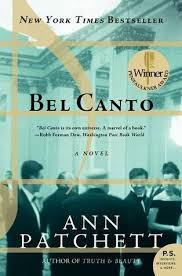So this week, I read Bel Canto. In an effort to be fully disclosing, a dear friend works as Ann Patchett’s Gal Friday. Probably the only reason this is relevant is that I bought Bel Canto solely because I wanted to read something of length by Niki’s boss.

No one really seemed that upset when I didn’t take a picture of my copy last week, so I think we’re just going to roll with the Good Reads image from now on.
I’ve really liked Ann Patchett’s work since I read an essay she wrote for Vogue about her friend and fellow writer Lucy Grealy. I tried in vain to find that essay and link it here, but suffice to say, it left its mark on me ten or so years ago and I remember it clearly, if not fondly (it’s not a happy essay). My mom read Bel Canto about the same time, I dismiss doing the same because I was 15 and things my mom liked were extremely uncool. I have since revisited this position and am happy to report I have read this book in its entirety!
The basic premise of the novel is that it is that a poor Latin American country has a birthday party for a wealthy Japanese businessman in hopes his company will build a plant of some stripe in their capital city. They invite a lot of dignitaries, and pay a very famous soprano to sing for guests. Things are going pretty well until a terrorist group breaks in through the air vents and holds everyone hostage. Despite the best efforts of the Red Cross, et al, the standoff lasts…a really long time. How long? Hard to say. Months, I think. Patchett never really says for sure, but it’s a really. long. time. A long time. Forever.
Without giving away a ton of plot points (because it’s well-paced and the character development is great), things get kind of weird! Several people fall in love with the aforementioned soporano, Roxane Coss. She falls in love in return, either once or twice, depending on how you count it. Mr. Hosokawa, the gentleman for whom this party is held, comes out of his shell. The Frenchman teaches the terrorists to cook! The vice president of the unnamed nation decides to adopt one of the hostage takers! You get the idea. Finally, everyone gets to go home, which is, I suppose, a foregone conclusion in nearly any given hostage situation.
I love how well Patchett captures the feeling of waiting for the main event to start, and how relationships build and crumble in unpleasant situations. The whole book is a study in waiting, in passing time. It’s months that the hostages are inside the vice presidential mansion, awaiting…something. By the time they’re finally rescued, the reader has worked out a way they could continue on like this indefinitely- the soprano singing, the Russians playing cards, the hostage takers watching soccer on the television, the commanding general playing chess in his stolen study.
The hostages become attached to their captors, who are, as it is revealed, really just kids taken from a remote village and given guns. Since Roxane is the only woman, she becomes incredibly beautiful to the others (I have long called this proximity hotness and I was a beneficiary of this principle on the national quiz bowl circuit long ago [more on this another time]). Everyone, it seems, confesses their undying love to her at some point or another, and she’s really dignified about that, like it happens all the time. By the last pages of the book, everyone is so intertwined with each other, you can’t imagine how they’re going to function outside in their normal lives.
I have just two criticisms of this book, and one is pretty minor. Since it’s a big ole cast of characters (some 60 or so named folks), sometimes they get grouped by national stereotypes that make me a little uncomfortable (the French guy has a scarf and cries often, the Russians are loud talkers, the Japanese are very uncomfortable often). The other is about the epilogue, but that’s for you to make your own mind up about. To me, it felt really confusing- I couldn’t make the logical jump to how the characters wrapped up there and so soon after.
Overall, Patchett has such command over narrative pacing and the English language more broadly, so I can’t recommend this book enough for people who like literary fiction but wish something would happen, damn it. There are guns and SWAT teams and stuff, but also operas. How can you lose? You can’t lose.
Next week, I’m reading this, and I hope you’ll join me! I read it on two short plane rides, so you have no excuse to not be part of my special club.
Okay, so tell me: what did you think of Bel Canto? Am I off-base about the epilogue? What did you love best? Got a favorite character? You have about a million to pick from.
